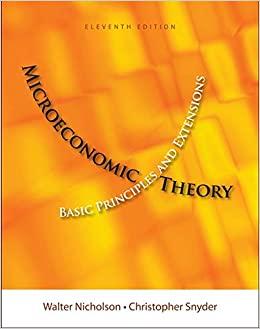18.1 A personal-injury lawyer works as an agent for his injured plaintiff. The expected award from the
Question:
18.1 A personal-injury lawyer works as an agent for his injured plaintiff. The expected award from the trial (taking into account the plaintiff ’s probability of prevailing and the damage award if she prevails) is l, where l is the lawyer’s effort. Effort costs the lawyer l 2
/2.
a. What is the lawyer’s effort, his surplus, and the plaintiff ’s surplus in equilibrium when the lawyer obtains the customary 1/3 contingency fee (i.e., the lawyer gets 1/3 of the award if the plaintiff prevails)?
b. Repeat part
(a) for a general contingency fee of c.
c. What is the optimal contingency fee from the plaintiff ’s perspective? Compute the associated surpluses for the lawyer and plaintiff.
d. What would be the optimal contingency fee from the plaintiff ’s perspective if she could ‘‘sell’’ the case to her lawyer [i.e., if she could ask him for an up-front payment in return for a specified contingency fee, possibly higher than in part (c)]?
Compute the up-front payment (assuming that the plaintiff makes the offer to the lawyer) and the associated surpluses for the lawyer and plaintiff. Do they do better in this part than in part (c)? Why do you think selling cases in this way is outlawed in many countries?
Step by Step Answer:

Microeconomic Theory Basic Principles And Extension
ISBN: 9781111525538
11th Edition
Authors: Walter Nicholson, Christopher M. Snyder






